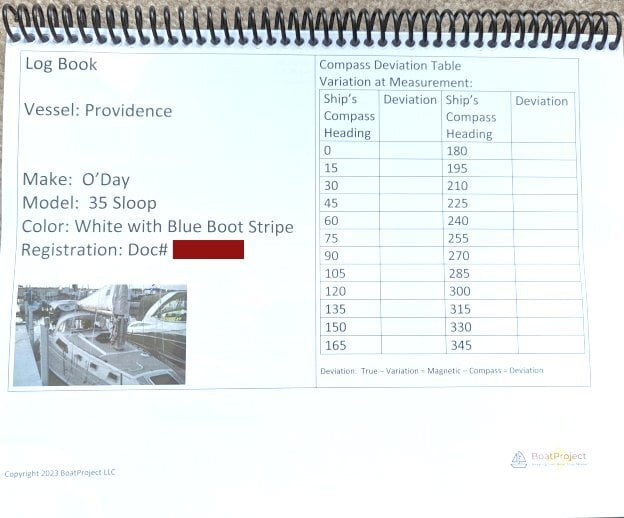Recreational vessels are not required to keep a ships log, but it's a great idea and here is why.

Commercial vessels are required to keep a ship's log. This log is a legal document and is referenced in the event of any mishap or reviewed when boarded and inspected.
But, I have a recreational sailboat and I keep a ship's log. Why? And how do I use it?
I keep a log book for my destination sails. Going out for a day-sail in the harbor and returning to where I left doesn't warrant a log entry in my book (ha! see what I did there?!) However, when I'm sailing somewhere, I need to know how to get there. On destination sails, I'm usually outside my known sailing waters, and further from help.
The log book serves multiple purposes.
It reminds me to check the weather thoroughly and record it. I am already being more thoughtful about the sail / motor. It reminds me to check all my fluids and battery levels prior to leaving. It reminds me to record my estimated time of arrival; this reminds me to text my safety person as to when to expect me and when to call the USCG if I don't arrive by a certain time.
Next, while underway, I record my speed, course, position, barometer, etc. every hour. This also serves multiple purposes, one of which is having a safety net if my GPS devices don't work. So recording your position every hour plus speed and heading will allow you to closely approximate your location, especially when there are no landmarks to reference.
Recording the barometric pressure will provide data to see if your pressure is rising/falling and how fast. Based on how fast the pressure changes will indicate if bad weather is on your horizon. Recording the sky conditions and sea state also help provide some context if things are starting to go badly. If you are thinking, 'I'll know if things are starting to go badly,' think again. As conditions slowly change and you adjust to those conditions, you can find yourself unprepared for a lot worse weather. The log provides data to show you where things are headed. It also confirms or contradicts any weather or changes in wind that were predicted. This helps to get a better feel for how good the forecast is.
The log is also a great way to hand off watches. The person coming on watch sits with the person coming off watch to fill out the log entry, goes through the other entries prior, and discusses any issues that occurred. Then the person coming off watch gives any current information (watching a storm front, trawlers off to starboard, etc.) so the new watch is going in well informed. When I do longer trips, I will actually plot on a paper chart my positions with times so that I have a good visual of where we are and how far we have to go. It's a good "big picture" look as chart plotters have limited screen space and generally are zoomed in so you can see local navigation hazards.
Also, one regulation that few boaters know is that you are required to record any radio traffic that you participate in. So, if you hailed another vessel, called for a bridge raise, or asked for a radio check (btw, if you do a radio check, PLEASE do it on channel 9 and NOT channel 16), it must be recorded. The log book gives you a place for that.
Tracking your sea time is also helpful if you go to get a captain's license, demonstrate to insurance your experience, or show to a charter company you have sea time and experience to bareboat charter. A log book is also a good place for tracking your maintenance.
And finally, having a log book gives you more credibility with the coast guard that you are following regulations and are a good boater. The log is a legal document and can help bolster your recounting of an incident should it be necessary.
In a later blog, I'll talk about how I prep for a longer sail and how I use paper charts and my log book to stay safe and have an immediate backup should my instruments go.
Silver and Gold subscribers of BoatProject can access a log book template that they can customize and print. Just go to Library, search for "Vessel Log Book" and select "Public Documents". You can download a word doc or pdf that you can print and/or edit. I sent mine to Staples to have printed and bound just by uploading the file to their site. It turned out great.
Feel free to comment below, and Happy and Safe Boating! Rich
